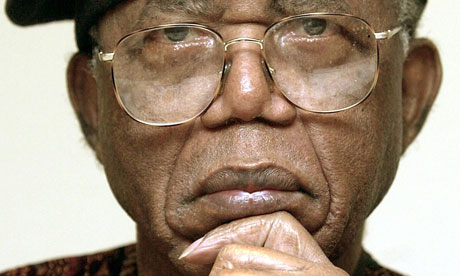I found this interesting interview summarizing the most
salient aspects of his life:
http://www.bbc.co.uk/iplayer/episode/p015sh93/The_Strand_The_death_of_Chinua_Achebe/
Chinua Achebe death: 'a mind able to penetrate the mystery of being human'
Nadine Gordimer on the fifty year career of the Nigerian author of Things Fall Apart, who has died in Boston aged 82.

Chinua Achebe: 'everything is grist to the mill of the artist' Photograph: Frank May/AFP/Getty Images
Taking the Irish poet WB Yeats's despairing statement of destruction –things fall apart – for its title, Chinua Achebe's first novel was a presentiment of what was to come in Nigeria during the end of the colonial occupations and their aftermath. It is the founding creation of modern African imaginative literature, the opening act of exploration into African consciousness using traditional modes of expression along with those appropriated from colonial culture, particularly the English language.
That first work was also prescient – not only of Achebe's creative powers to develop as a writer in subsequent works, but of the political upheavals, the embattled end of colonialism, the fight for freedom by which the lives of the people of Africa have been shaped.
Achebe lived through these times – a tragic civil war in his country – as an activist in extreme personal danger, finally exile, fulfilling Albert Camus' statement of what it means to be a writer: "The day when I am no more than a writer I shall cease to be a writer." He kept faith with this commitment. Yet during those years he wrote novels, stories, essays and poems that were a bold revelation to his countrymen and women and the world of what suppression and oppression really meant. And trust Achebe to give a new definition of colonialism. His collection of essays, recently reissued as a modern classic, is The Education of a British-protected Child.
Achebe's works do not fear to challenge those post-colonial, independent regimes in Africa who abuse personal power in every possible way – from banning political opposition, to corruption. His novel A Man of the People, a biting satire on corruption in freed African regimes, uses the blade of humour to alert us to official greed and the cant which legitimises it.
His work Chike and the River was republished in 2011. I read it with the sense of extraordinary entry into a brilliant (I do not use that word fashionably or lightly) mind, a writer's continuing achievement of penetrating the variety, possibilities, mystery of being human in the presence not only of one's own people and country, but of the world.
He did not shirk writing of what "I have chosen to call my Middle Passage, my colonial inheritance. To call my experience colonial heritage may surprise some people. But everything is grist to the mill of the artist. True, one grain may differ from another in its powers of nourishment; still, we must … accord appropriate recognition to every grain that comes our way."
What audience, what readers do you have in mind, who is it you are addressing yourself to? The somewhat testy answer is: we write for whoever will read our work.
It surely must mean a great deal to a writer to know that his or her work has reached through prison walls, having been longingly requested and received with difficulty by way of lawyers or rare visitors allowed a political prisoner.
Achebe had that rather special recognition when Nelson Mandela, 27 years behind prison walls, told Achebe what his novels brought to him: "There was a writer named Chinua Achebe in whose company the prison walls fell."
(extracted from: http://www.guardian.co.uk/books/2013/mar/22/chinua-achebe-death-nadine-gordimer)
Mind you, Nadime Gordimer is another ´must read´ exponent
of the African continent.

No comments:
Post a Comment